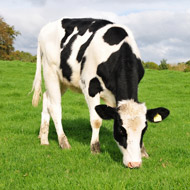Broiler litter thought to be behind NI botulism cases

All cattle and sheep can be affected by botulism, which is usually fatal and characterised by progressive muscle weakness (paralysis).
Broiler litter is thought to be behind many of the botulism outbreaks in Northern Ireland, according to the Agri-Food and Biosciences Institute (AFBI).
An investigation by AFBI's veterinary sciences division found "strong circumstantial evidence that broiler litter is a risk factor for many of these outbreaks". The risk relates to the contamination of broiler litter with chicken carcases, which are taken by scavenging animals and transferred onto pasture.
Botulism is a form of blood poisoning caused by Clostridium botulinum bacteria that can produce toxins in certain environmental conditions. The bacteria are found in the environment and rise to high levels in bird and animal carcases.
It is thought that broiler litter can become dangerous to ruminants when it is contaminated with the carcases of chickens that have died during production. Scavenger animals such as foxes and dogs may transfer carcases onto pasture, after gaining access to them during storage or after spreading on land.
All cattle and sheep can be affected by botulism, which is usually fatal and characterised by progressive muscle weakness (paralysis). Diagnosis is often based primarily on clinical signs and known history of exposure to contaminated litter.
In order to minimise the risk of botulism, prompt and careful disposal of carcases and litter is essential.
Veterinary surgeons may apply to the VMD for two vaccines, which are available under 'special treatment certification', but these should not be used as an alternative to preventing exposure to contaminated poultry litter.
For more information on the control of botulism, visit: https://www.daera-ni.gov.uk/news/botulism-cattle-ongoing-concern



 The Federation of Independent Veterinary Practices (FIVP) has announced a third season of its podcast, Practice Matters.
The Federation of Independent Veterinary Practices (FIVP) has announced a third season of its podcast, Practice Matters.